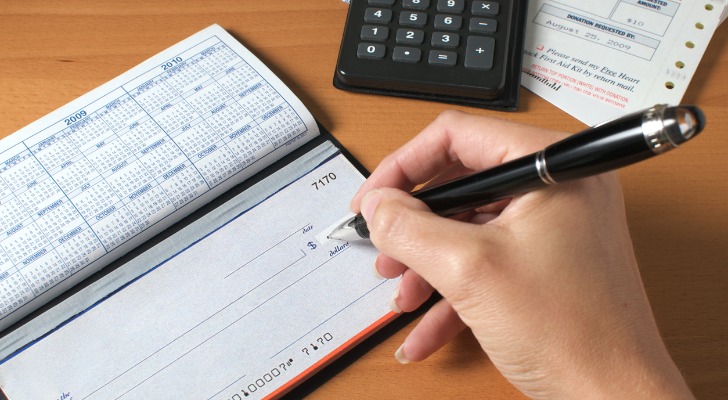An estate account is a specialized checking account used to manage a deceased person’s financial affairs. It allows an executor or administrator to collect assets, pay debts and distribute funds to beneficiaries. This type of account helps separate the estate’s funds from personal finances, streamlining the probate process and ensuring transactions are properly documented. To open an estate account, banks typically require legal documentation, such as a death certificate and court-issued letters of administration.
Consider working with a financial advisor as you build and manage your own estate plan. Connect with your advisor matches today.
What Is an Estate Account, and How Does One Work?
An estate checking account is a temporary account used by the executor of an estate to distribute monetary assets and pay the estate’s bills.
The executor can open an estate bank account once the estate receives its employer identification number (EIN) from the IRS. Although the estate may not be a business, this is the taxpayer identification number necessary to file taxes and open accounts.
After the account is opened, the executor or administrator deposits liquid assets from the estate, such as cash from personal bank accounts, proceeds from sold property and income from dividends or final paychecks. These funds are then used to settle outstanding debts, pay taxes and distribute inheritances according to the will or state intestacy laws.
Once all financial obligations are met, the remaining balance is distributed to beneficiaries and the account is closed. If the estate avoids probate through a trust or beneficiary designations, an estate account may not be necessary. However, for estates with multiple assets, liabilities or tax obligations, it can simplify financial management and legal compliance.
Do You Need an Estate Account?
Having an estate account is the appropriate method to handle an estate’s finances. Existing accounts from the deceased should not process ongoing transactions. Generally, the bank closes or freezes these accounts once it knows that the owner passed away. An estate checking account eliminates confusion about who is receiving the money and paying bills on behalf of the estate. It provides a fresh start on the estate’s finances to ensure that pre- and post-death transactions are completely separate.
An executor may pay for some of the estate’s expenses out of pocket, and receive reimbursement from the estate later. While this isn’t ideal, in some cases, it’s unavoidable. For example, there might be costs that arise immediately after death before an estate account is created.
An executor writing checks to themselves can give the appearance of self-dealing, fraud or other nefarious intentions, even if their actions were completely legitimate. Paying all expenses and other distributions through the estate account reduces the opportunity for conspicuous transactions.
How to Open an Estate Account
Estate accounts are the same account account type as a standard checking account from a bank. The difference is the bank titles the account to reflect that it represents the assets of an estate. The executor has authorization to conduct business on behalf of the estate.
To open an estate checking account, you’ll need to do the following:
- Begin the probate process.
- Obtain a copy of the will and/or trust.
- Receive the estate’s EIN.
- Collect documents verifying that you may handle the estate’s finances
- Provide a copy of the death certificate.
- Make an initial deposit.
Because an estate account is just like any other bank checking account, it will operate under the same rules. The account may require a minimum deposit amount to open. Plus, there may be requirements to waive the monthly service charge, such as a maintaining minimum average daily balance. Other fees may also apply, such as for ordering checks or receiving a wire transfer.
Estate Account vs. Trust Account

An estate account and a trust account serve distinct purposes in estate planning and asset management. An estate account is a temporary account used to manage a deceased person’s assets during probate, allowing an executor to pay debts and distribute funds to beneficiaries. It exists only until the estate is settled and then is closed.
A trust account, on the other hand, is established by a grantor during their lifetime or at death to hold and distribute assets according to the trust’s terms. Unlike estate accounts, trust accounts bypass probate, allowing beneficiaries to receive assets more quickly. A trustee, rather than an executor, manages the account based on the trust’s instructions. Because trusts can hold assets for years or even generations, they provide greater flexibility in wealth management.
Are Estate Accounts Taxed?
An estate account itself is not taxed, but the estate it manages may be subject to federal and state taxes. If the estate earns income, such as interest, dividends, or rental income, it must file an income tax return (Form 1041) and pay taxes on earnings before distributing assets to beneficiaries.
Estate taxes may also apply if the total estate value exceeds the federal exemption limit, which is $13.99 million in 2025 (increasing to $15 million in 2026).. Some states impose their own estate or inheritance taxes with lower thresholds. Executors must ensure that tax obligations are settled before closing the account. Beneficiaries typically do not pay income tax on their inheritance, but they may owe taxes on distributions from retirement accounts or income-generating assets received from the estate.
Managing Complex Estates With an Estate Account
Some estates involve more than simple bank account balances and final bills. When there are multiple beneficiaries, business interests, investment accounts or real estate properties, an estate account can help keep financial activity organized. It provides one place for all estate-related deposits and payments, which helps reduce mistakes and maintain accurate records.
If the estate continues to receive income after the date of death such as rent, dividends, royalties or outstanding payments owed to the decedent, those amounts can be deposited into the estate account. The account can also be used to pay ongoing expenses, including utility bills for a property, insurance premiums, professional fees or taxes. Keeping these transactions separate from an executor’s personal finances can help avoid questions about how money was handled.
When several beneficiaries are involved, a dedicated estate account can help document every payment made on behalf of the estate. This recordkeeping can make it easier to show how funds were used and can help reduce the risk of disputes later in the probate process.
If assets take time to sell or require appraisal, the estate account can hold the proceeds until distributions are made. This helps ensure that beneficiaries receive the correct amounts once all debts, taxes and expenses are paid.
Executors handling complex estates may work with estate attorneys or financial professionals to confirm which obligations must be paid, how assets should be liquidated and when distributions can be made under state law.
Bottom Line

An estate account is an integral part of the estate distribution process. It’s a temporary account that the executor uses to receive and distribute funds on behalf of the estate. In order to open an estate account, the executor must provide proof that they are legally able to do so. Once the account is open, it operates like any other checking account . The executor should operate with caution to ensure that they don’t commingle personal funds with those of the estate.
Tips for Estate Planning
- Planning for how your estate is distributed after your death is an important task. Developing a plan with a financial advisor that you know and trust can make the transition easier for your loved ones. Finding a qualified financial advisor doesn’t have to be hard. SmartAsset’s free tool matches you with vetted financial advisors who serve your area. You can have a free introductory call with your advisor matches to decide which one you feel is right for you. If you’re ready to find an advisor who can help you achieve your financial goals, get started now.
- To create a nest egg that will grow for generations, it helps to understand how investment returns will impact your portfolio. Our investment calculator forecasts how your portfolio can grow based on your starting amount, additional contributions, timeframe and investment returns.
Photo credit: ©iStock.com/jwohlfeil, ©iStock.com/Ridofranz, ©iStock.com/fizkes
